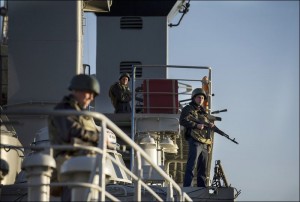Special to WorldTribune.com
LIGNET.com
Russia’s military incursion into Ukraine is aimed at restoring the government of ousted pro-Russia President Viktor Yanukovych and annexing the strategically important Crimean Autonomous Region. The developing crisis seemingly presents the United States and NATO with limited response options, but some form of action is vital to prevent Moscow’s moves from setting a destabilizing precedent.

American diplomatic responses thus far have been weak, uncoordinated and ineffective. Vague threats and chastisement have no impact and give the appearance of helplessness. … The United States can sharpen its diplomatic response to Moscow’s actions in Ukraine by planning specific responses to Russian aggression. … This LIGNET analysis lists 14 possible responses to Russian aggression in Ukraine.
- …. Convening a NATO crisis meeting to discuss means of supporting Ukraine immediately and in the event of a full-scale incursion. Establish a NATO crisis center to coordinate a combined regional response, and raise the alert level of the 25,000-man NATO Response Force.
- Offering to send military and other advisers to Ukraine both to render services to Kiev and to serve as a tripwire presence on the ground, raising the stakes should Russia choose to expand its military operations. In particular it is important to secure airports around Kiev, since Russia typically seizes airfields early in operations and uses them to airlift combat forces into the target country.
- Mounting a show of force in the Black Sea, which is an international waterway guaranteed by treaty. In August 2008, the United States and allied nations sent a NATO flotilla led by the U.S.S. McFaul (DDG-74) to patrol off the coast of Georgia. The Russia Black Sea fleet shifted positions rather than confront the flotilla, and the NATO presence helped dissuade Moscow from pressing matters further in Georgia. ….

You must be logged in to post a comment Login